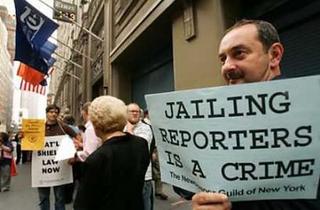Wednesday, July 06, 2005
When Journalists March & Protest
UPDATED: Breaking News at the bottom of this post.
Big news about news from the Plame/Wilson Affair today. Judith Miller, the Chalabi editor of The New York Times, has been jailed today, while Time Magazine's Matthew Cooper, after getting his source to sign a waiver (which, to me, sounds very unlikely that Karl Rove played his "deep throat"), testified before the grand jury.
As much as I despise Judy, I still don't think she should be imprisoned for this, and I fear that this will have a chilling effect on future whistleblowers.
Regardless about how one feels about this particular case, there are bills floating around in Congress which I think all of us should support. On June 27th, the Newspaper Association of America (N.A.A.), which represents more than 2,000 newspapers in North America, released a press release:
"Representatives Mike Pence (R-IN) and Rick Boucher (D-VA) and Senators Richard Lugar (R-IN) and Christopher Dodd (D-CT) have introduced the "Free Flow of Information Act." The legislation, H.R. 581 and S. 340, closely follows the U.S. Department of Justice guidelines that have been in place for more than 30 years, and allows testimony to be compelled from a journalist only after non-media sources have been exhausted and such testimony is essential to the investigation, prosecution or defense of a criminal case or essential to a dispositive issue in a civil case. The legislation also expands upon the guidelines by providing additional protection of the identities of confidential sources."
From H.R. 581:
"Free Flow of Information Act of 2005 - Prohibits Federal entities from compelling covered persons (specified media outlets or their employees) to testify or produce any document unless a court determines by clear and convincing evidence that: (1) the entity has unsuccessfully attempted to obtain such testimony or document from all non-covered persons; and (2) in a criminal matter, based on information from a non-covered person, there are reasonable grounds to believe a crime has occurred and the testimony or document is essential to the investigation, prosecution, or defense; or (3) in a non-criminal matter, based on information from a non-covered person, the testimony or document is essential to a dispositive issue of substantial importance."
"Requires the content of compelled testimony or documents to be: (1) limited to the purpose of verifying published information; and (2) narrowly tailored in subject matter and time period covered."
"Excludes certain commercial or financial information from coverage under this Act."
"Prohibits compelled disclosure, notwithstanding this Act's conditions for such disclosure, of: (1) the identity of a confidential source; or (2) information reasonably expected to lead to the discovery of such identity. Makes this Act applicable to testimony or documents sought from third parties that are related to business transactions with covered persons. Authorizes compelled disclosure in such cases only where the covered person has received notice and an opportunity to be heard."
"States that publication or dissemination of testimony or documents does not waive the requirements for compelled disclosure set forth in this Act."
But I couldn't help but get a kick out of this photograph that I saw on this Reuters article about Judy Miller and Matthew Cooper ("New York Times reporter sent to jail in leak case" by James Vicini):

The text beneath the Reuters photo reads "Jeff Z Klein, an editor at The New York Times, gathers with fellow employees outside."
Unless I'm mistaken, The New York Times expressly forbids their employees to participate in political protests.
Why is this situation any different? Surely, the illegal invasion of Iraq affects the press as much as the jailing of a fellow reporter. Or maybe not.
UPDATE
Uh oh.
I think Jeff Z Klein might be in trouble (as well as the other staff members of The New York Times that are shown in the above Reuters photo).
This is a link to "Ethical Journalism: A Handbook of Values and Practices for the News and Editorial Departments" which is on The New York Times corporate Website and was released in September of 2004: pdf link.
In part five of the handbook, within the section entitled "Participation In Public Life" the policy for The New York Times is explicitly written in reference to the participation of staff members in public protests:
65. "Staff members may not march or rally in support of public causes or movements, sign ads taking a position on public issues, or lend their name to campaigns, benefit dinners or similar events if doing so might reasonably raise doubts about their ability or The Times’s ability to function as neutral observers in covering the news. Staff members must keep in mind that neighbors and other observers commonly see them as representatives of The Times."
Whoops.
Why does The New York Times have such a policy?
67. "Staff members must be sensitive that perfectly proper political activity by their spouses, family or companions may nevertheless create conflicts of interest or the appearance of conflict. When such a possibility arises, the staff member should advise his or her department head and the standards editor or the deputy editorial page editor. Depending on circumstances, the staff member may have to recuse himself or herself from certain coverage or even move to a job unrelated to the activities in question."
But perhaps Jeff Z Klein got permission to publicly rally in protest...:
68. "A staff member with any doubts about a proposed political activity should consult the standards editor or the deputy editorial page editor. These restrictions protect the heart of our mission as journalists. Though The Times will consider matters case by case, it will be exceedingly cautious before permitting an exception."
So has there been a change in policy?
Are staff members of The New York Times now allowed to march and rally in political situations, just so long as the management supports their cause?
What's the word that comes to mind?
Credibility.
|
